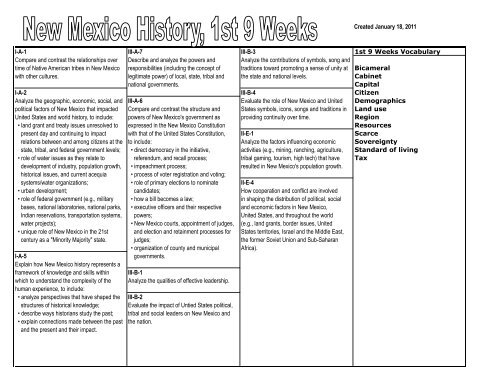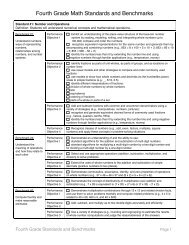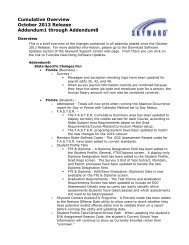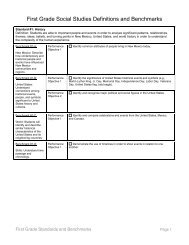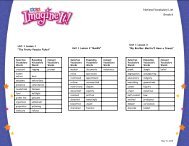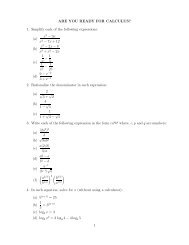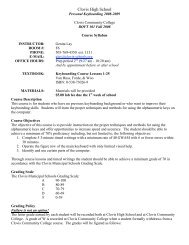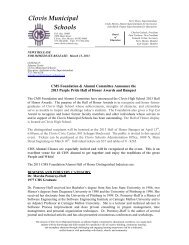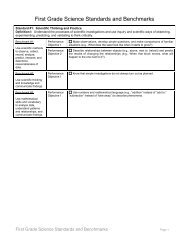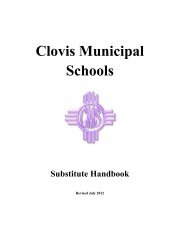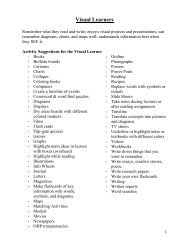New Mexico history - Clovis Municipal School District
New Mexico history - Clovis Municipal School District
New Mexico history - Clovis Municipal School District
You also want an ePaper? Increase the reach of your titles
YUMPU automatically turns print PDFs into web optimized ePapers that Google loves.
Created January 18, 2011<br />
I-A-1 III-A-7 III-B-3 1st 9 Weeks Vocabulary<br />
Compare and contrast the relationships over Describe and analyze the powers and Analyze the contributions of symbols, song and<br />
time of Native American tribes in <strong>New</strong> <strong>Mexico</strong> responsibilities (including the concept of traditions toward promoting a sense of unity at Bicameral<br />
with other cultures. legitimate power) of local, state, tribal and the state and national levels. Cabinet<br />
national governments.<br />
Capital<br />
I-A-2 III-B-4 Citizen<br />
Analyze the geographic, economic, social, and III-A-6 Evaluate the role of <strong>New</strong> <strong>Mexico</strong> and United Demographics<br />
political factors of <strong>New</strong> <strong>Mexico</strong> that impacted Compare and contrast the structure and States symbols, icons, songs and traditions in Land use<br />
United States and world <strong>history</strong>, to include: powers of <strong>New</strong> <strong>Mexico</strong>'s government as providing continuity over time. Region<br />
• land grant and treaty issues unresolved to expressed in the <strong>New</strong> <strong>Mexico</strong> Constitution Resources<br />
present day and continuing to impact with that of the United States Constitution, II-E-1 Scarce<br />
relations between and among citizens at the to include: Analyze the factors influencing economic Sovereignty<br />
state, tribal, and federal government levels; • direct democracy in the initiative, activities (e.g., mining, ranching, agriculture, Standard of living<br />
• role of water issues as they relate to referendum, and recall process; tribal gaming, tourism, high tech) that have Tax<br />
development of industry, population growth, • impeachment process; resulted in <strong>New</strong> <strong>Mexico</strong>'s population growth.<br />
historical issues, and current acequia • process of voter registration and voting;<br />
systems/water organizations; • role of primary elections to nominate II-E-4<br />
• urban development; candidates; How cooperation and conflict are involved<br />
• role of federal government (e.g., military • how a bill becomes a law; in shaping the distribution of political, social<br />
bases, national laboratories, national parks, • executive officers and their respective and economic factors in <strong>New</strong> <strong>Mexico</strong>,<br />
Indian reservations, transportation systems, powers; United States, and throughout the world<br />
water projects); • <strong>New</strong> <strong>Mexico</strong> courts, appointment of judges, (e.g., land grants, border issues, United<br />
• unique role of <strong>New</strong> <strong>Mexico</strong> in the 21st and election and retainment processes for States territories, Israel and the Middle East,<br />
century as a "Minority Majority" state. judges; the former Soviet Union and Sub-Saharan<br />
• organization of county and municipal Africa).<br />
I-A-5 governments.<br />
Explain how <strong>New</strong> <strong>Mexico</strong> <strong>history</strong> represents a<br />
framework of knowledge and skills within III-B-1<br />
which to understand the complexity of the Analyze the qualities of effective leadership.<br />
human experience, to include:<br />
• analyze perspectives that have shaped the III-B-2<br />
structures of historical knowledge; Evaluate the impact of Untied States political,<br />
• describe ways historians study the past; tribal and social leaders on <strong>New</strong> <strong>Mexico</strong> and<br />
• explain connections made between the past the nation.<br />
and the present and their impact.
Created January 18, 2011<br />
I-A-1 I-A-3 2nd 9 Weeks Vocabulary<br />
Compare and contrast the relationships over Analyze the role and impact of <strong>New</strong> <strong>Mexico</strong><br />
time of Native American tribes in <strong>New</strong> <strong>Mexico</strong> and <strong>New</strong> Mexicans in World War II (e.g., Acequias<br />
with other cultures. Native Code Talkers, <strong>New</strong> <strong>Mexico</strong> National Assimilation<br />
Guard, internment camps, Manhattan Project,<br />
Concurrent powers<br />
I-A-2 Bataan Death March). Cultural perspective<br />
Analyze the geographic, economic, social, and<br />
Ecosystem<br />
political factors of <strong>New</strong> <strong>Mexico</strong> that impacted I-A-4 Environment<br />
United States and world <strong>history</strong>, to include: Analyze the impact of the arts, sciences, and Erosion<br />
• land grant and treaty issues unresolved to technology of <strong>New</strong> <strong>Mexico</strong> since World War II Ethnicity<br />
present day and continuing to impact (e.g., artists, cultural artifacts, nuclear Infrastructure<br />
relations between and among citizens at the weapons, the arms race, technological Internment camps<br />
state, tribal, and federal government levels; advances, scientific developments, high tech Land grant<br />
• role of water issues as they relate to industries, federal laboratories). Property rights<br />
development of industry, population growth,<br />
Tourism<br />
historical issues, and current acequia II-D-1 Urbanization<br />
systems/water organizations;<br />
Analyze how the Earth's physcial processes<br />
• urban development;<br />
are dynamic and interactive.<br />
• role of federal government (e.g., military<br />
bases, national laboratories, national parks, II-D-2<br />
Indian reservations, transportation systems, Analyze the importance of ecosystems in<br />
water projects);<br />
understanding environments.<br />
• unique role of <strong>New</strong> <strong>Mexico</strong> in the 21st<br />
century as a "Minority Majority" state. II-D-3<br />
Explain and analyze how water is a scarce<br />
I-A-5<br />
resource in <strong>New</strong> Mexio, both in quantity and<br />
Explain how <strong>New</strong> <strong>Mexico</strong> <strong>history</strong> represents a quality.<br />
framework of knowledge and skills within<br />
which to understand the complexity of the II-D-4<br />
human experience, to include:<br />
Explain the dynamics of the four basic<br />
• analyze perspectives that have shaped the components of the Earth's physical systems<br />
structures of historical knowledge; (atmosphere, biosphere, lithosphere, and<br />
• describe ways historians study the past; hydrosphere).<br />
• explain connections made between the past<br />
and the present and their impact.


